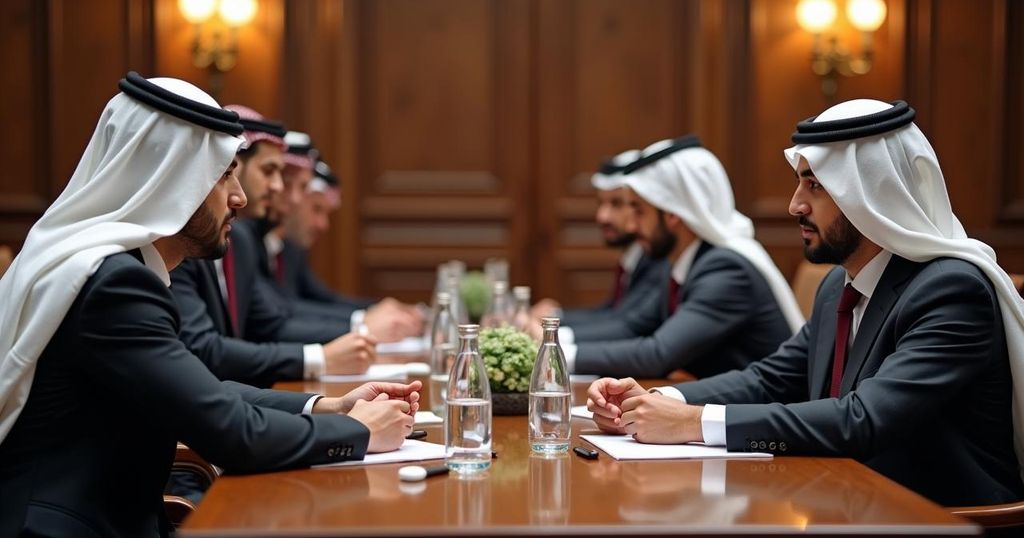Egypt’s Foreign Minister Badr Abdelatty has held discussions with Qatari Prime Minister Mohammed bin Abdulrahman Al Thani to address the situations in Lebanon and Gaza, emphasizing the need for ceasefires, humanitarian aid, and enhanced support for Lebanese institutions amid ongoing tensions, particularly following Israeli military actions.
On Saturday, Egypt’s Foreign Minister, Badr Abdelatty, engaged in a telephone conversation with Qatar’s Prime Minister and Foreign Minister, Mohammed bin Abdulrahman Al Thani, to deliberate on the pressing circumstances in Lebanon and Gaza. During this discussion, the two officials evaluated the ongoing efforts to secure a ceasefire in Gaza, facilitate the release of hostages, and ensure the unobstructed delivery of humanitarian assistance to the beleaguered region. Minister Abdelatty also highlighted Egypt’s mediation role in achieving Palestinian reconciliation, particularly through hosting discussions between Fatah and Hamas in Cairo. He had previously conferred with France’s Foreign Minister, Jean-Yves Le Drian, regarding developments in Lebanon and Gaza. In a statement released by Egypt’s Foreign Ministry, spokesperson Ambassador Tamim Khallaf elaborated on concerns expressed by Abdelatty regarding the escalation of violence in Lebanon, notably following attacks by the Israeli army on UN Interim Force in Lebanon (UNIFIL) positions that resulted in injuries to two UN peacekeepers. Abdelatty underscored the necessity for the Israeli military to guarantee the safety of UN personnel and assets. In his discussions, Minister Abdelatty advocated for an immediate ceasefire and emphasized the importance of de-escalating regional tensions. He reiterated Egypt’s commitment to upholding Lebanon’s sovereignty and territorial integrity, as well as empowering its institutions, particularly the Lebanese Armed Forces. He also called for adherence to the United Nations Security Council Resolution 1701, which is vital for stabilizing the situation in southern Lebanon. The dialogue between the ministers also covered the deteriorating humanitarian conditions in Lebanon, exacerbated by continued Israeli hostilities. They emphasized the critical need for empowered Lebanese institutions and the implementation of UN Resolution 1701, which aims to reinforce the Lebanese army’s presence in southern regions and facilitate the selection of a president through national consensus. Abdelatty expressed profound concern regarding the humanitarian crisis impacting more than 1.2 million displaced individuals in Lebanon, urging for immediate humanitarian and relief assistance to aid the Lebanese government’s efforts in managing this crisis. He reiterated the necessity of a ceasefire in Gaza to guarantee full humanitarian access and halt Israeli military actions in the West Bank. Additionally, he acknowledged France’s commitment to Palestinian rights and its support for the establishment of an independent Palestinian state based on the two-state solution.
The current geopolitical situation in Lebanon and Gaza has become increasingly precarious, influenced by escalating violence, humanitarian crises, and diplomatic efforts to achieve stability and peace. The involvement of Egypt, France, and Qatar highlights the regional dimension of these issues, as countries work to mediate and support ceasefire initiatives while addressing humanitarian needs. Resolution 1701 plays a significant role in shaping the political landscape in Lebanon, particularly in terms of international engagement and the empowerment of local institutions. This diplomatic discourse takes place against a backdrop of increasing tensions and humanitarian distress, especially in the wake of Israeli military actions and internal political challenges within Lebanon and Palestine.
In summary, Egypt’s Foreign Minister Badr Abdelatty has taken significant steps to engage in diplomatic discussions regarding the critical situations in Lebanon and Gaza. Through direct conversations with both Qatari and French counterparts, he has underscored the urgency of achieving ceasefires, securing humanitarian aid, and fostering Palestinian reconciliation. The focus on international cooperation and adherence to UN resolutions reflects an organized approach to addressing the escalating violence and humanitarian crises in the region, aiming to restore peace and stability for the affected populations.
Original Source: www.dailynewsegypt.com






